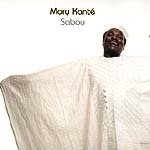- artist:MORY KANTE
- release year:2004
- country:Guinea
- formats:CD (Compact Disc)
- record posted by:International Stage Productions, Inc.
- label:Riverboat Records
Riverboat Records and World Music Network are proud to present Sabou by the legendary West African singer and kora player Mory Kanté. Sabou is an all-acoustic release by the first African artist to sell a million singles with 'Yéké Yéké', which topped the European charts in 1988. An exceptionally talented griot from Guinea in West Africa and a contemporary with Salif Keita in the Rail Band back in the 1970s, Mory Kanté has produced a stunning new album of depth and poise that is firmly grounded in his traditional griot roots.
Sabou is Mory Kanté’s eagerly anticipated new album. Combining the knowledge of his traditional griot roots and his experiences in the pop mainstream, this innovative album sounds simultaneously contemporary and rootsy. With the exception of the acoustic guitar, Mory Kanté has used only traditional West African instruments on this album. Whipping up a clean and fresh sound, amazing balafon players stand out next to uplifting kora solos, with fantastic percussion and outstanding voices completing the mix, together creating a beautiful kaleidoscope of sound – Sabou is a must-hear album.
For Mory, being a griot has always been an integral part of his life and music, and Sabou unites his rich musical knowledge. Hailing from a long and gifted line of griots, he has always maintained a strong interest in continuing and developing griot traditions. A remarkably talented kora and balafon player with a powerful and distinctive voice, Mory was originally taught by his grandfather and went through his griot initiation when he was 15. He joined the Rail Band in 1971 and later moved to Abidjan and then Paris where he met with global success. Along the way he enthusiastically explored and mastered the numerous styles of music he encountered.
At a recent performance in London, of a partially acoustic set, Mory’s performance was reviewed as follows: ‘Kanté’s waterfall of percussion, swirled towards the high-pitched harmonies of his backing vocalists, found counterpoints in poignant wooden flute and the balafon’s enchanted plinking. It was like peering under the lid of a West African music box, with Kanté and his soaring tenor at the centre.' Evening Standard (18 May 2004)



